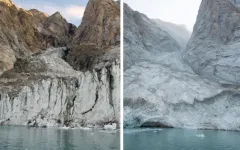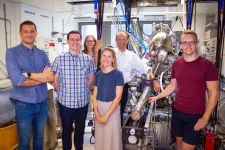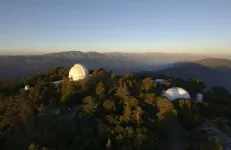(Press-News.org) Personalized conversations with a trained artificial intelligence (AI) chatbot can reduce belief in conspiracy theories – even in the most obdurate individuals – according to a new study. The findings, which challenge the idea that such beliefs are impervious to change, point to a new tool for combating misinformation. “It has become almost a truism that people ‘down the rabbit hole’ of conspiracy belief are almost impossible to reach,” write the authors. “In contrast to this pessimistic view, we [show] that a relatively brief conversation with a generative AI model can produce a large and lasting decrease in conspiracy beliefs, even among people whose beliefs are deeply entrenched.” Conspiracy theories – beliefs that some secret but influential malevolent organization is responsible for an event or phenomenon – are notoriously persistent and pose a serious threat to democratic societies. Yet despite their implausibility, a large fraction of the global population has come to believe in them, including as much as 50% of the United States population by some estimates. The persistent belief in conspiracy theories despite clear counterevidence is often explained by social-psychological processes that fulfill psychological needs and by the motivation to maintain identity and group memberships. Current interventions to debunk conspiracies among existing believers are largely ineffective.
Thomas Costello and colleagues investigated whether Large Language Models (LLMs) like GPT-4 Turbo can effectively debunk conspiracy theories by using their vast information access and by using tailored counterarguments that respond directly to specific evidence presented by believers. In a series of experiments encompassing 2,190 conspiracy believers, participants engaged in several personalized interactions with an LLM, sharing their conspiratorial beliefs and the evidence they felt supported them. In turn, the LLM responded by directly refuting these claims through tailored, factual and evidence-based counterarguments. A professional fact-checker hired to evaluate the accuracy of the claims made by GPT-4 Turbo reported that, of these claims, 99.2% were rated as “true,” 0.8% as “misleading,” and 0 as “false”; and none were found to contain liberal or conservative bias. Costello et al. found that these AI-driven dialogues reduced participants’ misinformed beliefs by an average of 20%. This effect lasted for at least 2 months and was observed across various unrelated conspiracy theories, as well as across demographic categories. According to the authors, the findings challenge the idea that evidence and arguments are ineffective once someone has adopted a conspiracy theory. They also question social-psychological theories that focus on psychological needs and motivations as the main drivers of conspiracy beliefs. “For better or worse, AI is set to profoundly change our culture,” write Bence Bago and Jean-François Bonnefon in a related Perspective. “Although widely criticized as a force multiplier for misinformation, the study by Costello et al. demonstrates a potential positive application of generative AI’s persuasive power.”
A version of the chatbot referenced in this paper can be visited at https://www.debunkbot.com/conspiracies.
***A related embargoed news briefing was held on Tuesday, 10 September, as a Zoom Webinar. Recordings can be found at the following links:
Video: https://aaas.zoom.us/rec/share/aoSQ0AgWVHF0l7vE9-6LHHqmiLdxgApjJk_VQekHv7VidXfTZozRZOXxkXm3swi9.YUuogoQ-ZGLnAbnM
Audio: https://aaas.zoom.us/rec/share/bTiYBoHcxYdKkzivIwYgt_Fd3Qg0Xll0aw_oc6vns03kyqayp-wZ9sbHDBGBSpZY.a41AWWIqSI-QcUqH
The passcode for both is &M67bgdd
END
An exit for even the deepest rabbit holes: Personalized conversations with chatbot reduce belief in conspiracy theories
Summary author: Walter Beckwith
2024-09-12
ELSE PRESS RELEASES FROM THIS DATE:
How is open access transforming science communication?
2024-09-12
In a Policy Forum, Mark McCabe and Frank Mueller-Langer explore how new open access (OA) mandates and agreements are changing how scientists share their work. They outline key contemporary unknowns in the open access landscape, as well as avenues for continued research. Since 2003, many national governments and international organizations have supported the Berlin Declaration on Open Access (OA) to Knowledge. More recently, some governments and organizations have introduced mandates to ensure open access ...
US food waste bans fail to reduce landfill waste, except in Massachusetts
2024-09-12
State-level bans on commercial organic waste disposal have largely failed to reduce landfilled waste across the U.S., with one state standing out as the lone success, according to a new study. Massachusetts alone achieved a significant reduction in landfilled waste when it implemented food waste bans. The findings underscore the importance of well-designed and enforced policies, with Massachusetts offering a potential model for effective waste management. “Our study shows that food waste bans are far from guaranteed to be successful,” ...
Greenland landslide-induced tsunami produced global seismic signal that lasted 9 days
2024-09-12
In 2023, a massive rockslide in East Greenland, driven by glacial melt, triggered a towering tsunami and a rare global seismic signal that resonated for nine days, according to a new study. The study provides insights into how climate change-induced events like glacial thinning can lead to significant geophysical phenomena with impacts extending throughout the Earth system. Due to climate change, steep slopes are increasingly vulnerable to landslides. In Arctic regions – which are undergoing the most rapid warming globally ...
Climate change-triggered landslide unleashes a 650-foot mega-tsunami
2024-09-12
In September 2023, scientists around the world detected a mysterious seismic signal that lasted for nine straight days. An international team of scientists, including seismologists Alice Gabriel and Carl Ebeling of UC San Diego’s Scripps Institution of Oceanography came together to solve the mystery.
A new study published today in Science provides the stunning solution: In an East Greenland fjord, a mountaintop collapsed into the sea and triggered a mega-tsunami about 200 meters (650 feet) tall. The giant ...
New study reveals food waste bans ineffective in reducing landfill waste, except in Massachusetts
2024-09-12
Of the first five U.S. states to implement food waste bans, only Massachusetts was successful at diverting waste away from landfills and incinerators, according to a new study from the University of California Rady School of Management.
The paper, published today in Science, suggests a need to reevaluate current strategies, citing Massachusetts' approach as a benchmark for effective policy implementation.
Between 2014 and 2024, nine U.S. states made it unlawful for commercial waste generators—such as grocery chains—to dispose of their food waste in landfills, expecting a 10–15% waste reduction.
“We ...
New research reveals how El Nino caused the greatest ever mass extinction
2024-09-12
Mega ocean warming El Niño events were key in driving the largest extinction of life on planet Earth some 252 million years ago, according to new research.
The study, published today in Science and co-led by the University of Bristol and China University of Geosciences (Wuhan), has shed new light on why the effects of rapid climate change in the Permian-Triassic warming were so devastating for all forms of life in the sea and on land.
Scientists have long linked this mass extinction to vast volcanic eruptions in what is now Siberia. The resulting carbon dioxide emissions rapidly accelerated climate warming, resulting in widespread stagnation and the collapse ...
Climate-change-triggered landslide caused Earth to vibrate for nine days
2024-09-12
A landslide in a remote part of Greenland caused a mega-tsunami that sloshed back and forth across a fjord for nine days, generating vibrations throughout Earth, according to a new study involving UCL researchers.
The study, published in the journal Science, concluded that this movement of water was the cause of a mysterious, global seismic signal that lasted for nine days and puzzled seismologists in September 2023.
The initial event, not observed by human eye, was the collapse of a 1.2km-high mountain peak into the remote Dickson Fjord beneath, causing a backsplash of water 200 metres in the air, with a wave up to 110 metres high. This ...
Microbe dietary preferences influence the effectiveness of carbon sequestration in the deep ocean
2024-09-12
Woods Hole, Mass. (September 13, 2024) - The movement of carbon dioxide (CO2) from the surface of the ocean, where it is in active contact with the atmosphere, to the deep ocean, where it can be sequestered away for decades, centuries, or longer, depends on a number of seemingly small processes.
One of these key microscale processes is the dietary preferences of bacteria that feed on organic molecules called lipids, according to a journal article, "Microbial dietary preference and interactions affect the export of lipids to the deep ocean," published in Science.
"In ...
The insulator unraveled
2024-09-12
Aluminum oxide (Al2O3), also known as alumina, corundum, sapphire, or ruby, is one of the best insulators used in a wide range of applications: in electronic components, as a support material for catalysts, or as a chemically resistant ceramic, to name a few. Knowledge of the precise arrangement of the surface atoms is key to understanding how chemical reactions occur on this material, such as those in catalytic processes. Atoms inside the material follow a fixed arrangement, giving rise to the characteristic shapes ...
$3.5M grant to Georgia State will fuel space research across the globe
2024-09-12
ATLANTA — A new three-year, $3.5 million grant from the U.S. National Science Foundation will foster new research at Georgia State’s Center for High Angular Resolution Astronomy (CHARA) Array by astronomers from around the world.
The grant will fund open-access time at the CHARA Array through the NSF National Optical-Infrared Astronomy Research Laboratory (NSF NOIRLab). The program offers astronomers the opportunity to apply for observing time at the CHARA Array to investigate all kinds of objects ...
LAST 30 PRESS RELEASES:
The world’s largest brain research prize awarded for groundbreaking discoveries on how we sense touch and pain
Magnetofluids help to overcome challenges in left atrial appendage occlusion
Brain-clearing cells offer clues to slowing Alzheimer’s disease progression
mRNA therapy restores fertility in genetically infertile mice
Cloaked stem cells evade immune rejection in mice, pointing to a potential universal donor cell line
Growth in telemedicine has not improved mental health care access in rural areas, study finds
Pitt scientists engineer “living eye drop” to support corneal healing
Outcomes of older adults with advanced cancer who prefer quality of life vs prolonging survival
Lower music volume levels in fitness class and perceived exercise intensity
Of crocodiles, counting and conferences
AERA announces 2026 award winners in education research
Saving two lives with one fruit drop
Photonic chips advance real-time learning in spiking neural systems
Share of migratory wild animal species with declining populations despite UN treaty protections worsens from 44% to 49% in two years; 24% face extinction, up 2%
One in 20 babies experiences physical abuse, global review finds
Tundra tongue: The science behind a very cold mistake
Targeting a dangerous gut infection
Scientists successfully harvest chickpeas from “moon dirt”
Teen aggression a warning sign for faster aging later in life
Study confirms food fortification is highly cost-effective in fighting hidden hunger across 63 countries
Special issue elevates disease ecology in marine management
A kaleidoscope of cosmic collisions: the new catalogue of gravitational signals from LIGO, Virgo and KAGRA
New catalog more than doubles the number of gravitational-wave detections made by LIGO, Virgo, and KAGRA observatories
Antifibrotic drug shows promise for premature ovarian insufficiency
Altered copper metabolism is a crucial factor in inflammatory bone diseases
Real-time imaging of microplastics in the body improves understanding of health risks
Reconstructing the world’s ant diversity in 3D
UMD entomologist helps bring the world’s ant diversity to life in 3D imagery
ESA’s Mars orbiters watch solar superstorm hit the Red Planet
The secret lives of catalysts: How microscopic networks power reactions
[Press-News.org] An exit for even the deepest rabbit holes: Personalized conversations with chatbot reduce belief in conspiracy theoriesSummary author: Walter Beckwith





